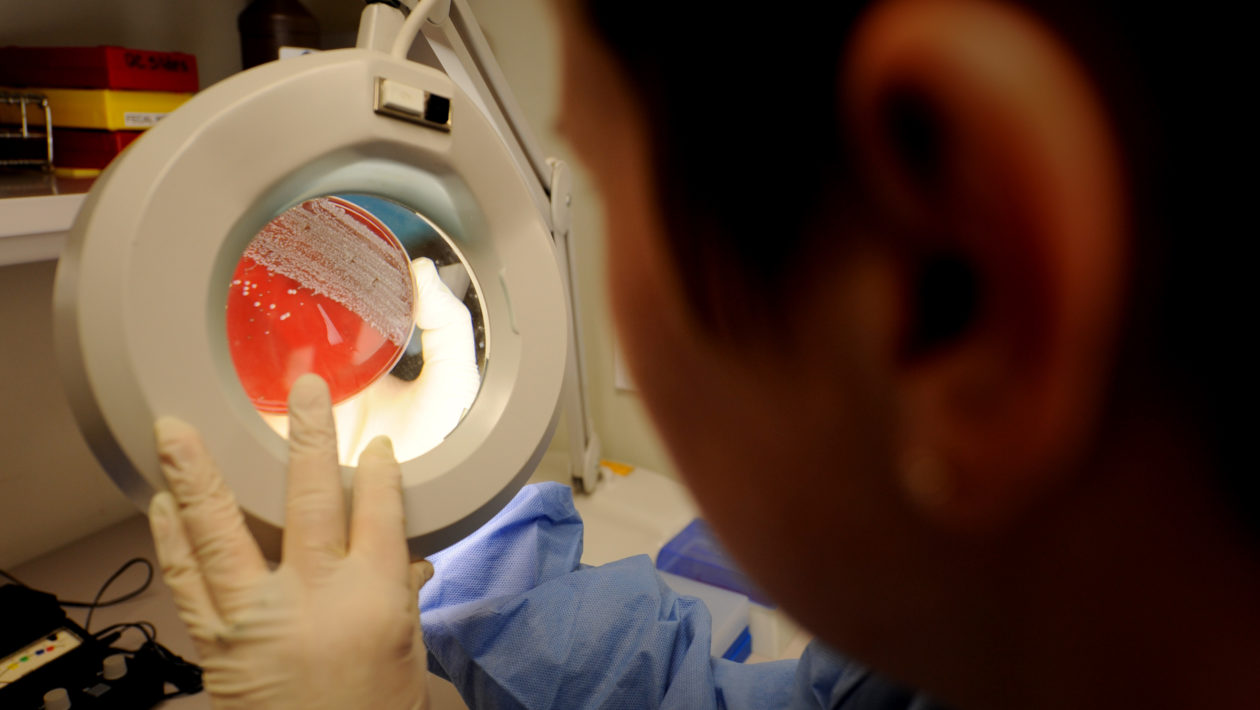We have a strep throat due to a bacterial infection. The strep throat symptoms make you have a scratchy and sore throat. Strep throat vindicates a minor percentage of sore throat infections.
If you keep strep throat symptoms unaddressed, they may lead to other health disorders. Rheumatic fever being one of them gives you symptoms like skin rash, painful joints or irregular heartbeats. These can damage heart valves and needs to be treated immediately. Untreated strep throat can also cause kidney inflammation and many other severe conditions.
Strep throat is common regardless of age. But children are mostly seen to have this infection. So, if you see your kid or anyone with strep throat symptoms, call your doctor at the earliest.
Strep throat causes
Streptococcus pyogenes (Group A Streptococcus) bacteria cause strep throat infection. The infection occurs when the bacteria affect your pharyngeal tissues. This causes inflammation to the tonsils and throat. Generally, these bacteria are found in your skin or throat and can cause other illnesses too. Impetigo, skin infection is one such illness, which is caused by streptococcus bacteria. Some people are also seen to carry these bacteria in their skin or throat and show no symptoms (asymptomatic) of the infection.
School-going children and adolescents are mostly seen to have strep throat. The most infected age group is from 5 to 15 years, with an average of 15% to 40% sore throat infections, caused by Group A streptococcus bacteria. Adults are seldom seen to have strep throat, with an average percentage of 5 to 10.
You may experience strep throat symptoms amidst late autumn or by early spring. Although bacteria cause strep throat infections, the majority of the sore throat infections occur due to viruses. Generally, you will find viral throat infections to cure by itself. Moreover, it doesn’t require or react to any treatments by antibiotics. However, you need to identify strep throat symptoms expeditiously, before it gives rise to any other health complications.
According to a leading ENT Doctor in Dubai, it is important to address strep throat issues in a serious fashion. This is because an infection in the throat can easily lead to fever. It is best that people that have strep throat avoid taking medicines and pills from the local pharmacy without first getting in touch with a trained medical professional.
Is Strep Throat Contagious?
You must be wondering if strep throat is communicable or not? Yes! It’s highly contagious. If you happen to be close to anyone who is infected by streptococcus bacteria, you will be infected as well. Transmission of this illness is through airborne respiratory droplets like nasal secretions or saliva. Consequently, you will find people who are in close environs to one another, getting infected easily. For example, college campuses, schools, military garrisons, and more. But you will hardly see strep throat infection transmission through food.
Strep Throat Symptoms
Some of the common strep throat symptoms are written below. These are:
- Severe throat pains
- Difficulty in swallowing
- Swollen-up tonsils, that appear red or white patches filled with pus
- Small red rashes near the hard or soft palate
- Tender and inflated lymph nodes in the neck and jawline
- High Fever
- Head-pains
- Skin Rash
- Nausea (usually occurs in young children)
- Joint pains and Body aches
In case, of a viral ailment or any other illnesses, you may get similar symptoms to strep throat. Then how are you going to differentiate between strep throat symptoms and any other infections? This is when you need to consult your doctor. If you face any of the above symptoms call your doctor. Specific tests can be done to identify a strep throat infection. You must keep in mind, that strep throat can also be asymptomatic, which means it shows no symptoms.
When to call the doctor?
If you see your kid or yourself with any strep throat symptoms, consult your doctor promptly. Go through the points below and you will know exactly when to call the doctor:
- Sore throat along with inflated and tender lymph glands
- If a sore throat persists more than 48 hours
- High fever
- Existing sore throat, followed by skin rashes
- Difficulty in swallowing or breathlessness
Note: If your diagnosis of strep throat is positive, observe yourself for 48hrs. If you see no improvements after the antibiotic dosages, call your doctor immediately.
Strep throat treatment – antibiotics
Antibiotics can kill group A streptococcus bacteria. These group of drugs can destroy bacteria and shows no effects on viral sore throat infections. Antibiotics help you in a few ways, which are:
- Soothes sore throat and other strep throat symptoms
- Reduces the probability of the infection to spread
- Prevents further complications like-tonsil and sinus infections or rheumatic fever
You will find doctors treating strep throat symptoms with amoxicillin or penicillin. Doctors prefer these antibiotic drugs as they are safe and economical, and is very effective on streptococcus bacteria.
Adults or children who show allergic reactions to penicillin are prescribed one of the following antibiotics.
- Clarithromycin (Biaxin)
- Azithromycin (Zmax, Zithromax, Z-Pak)
- Clindamycin (Cleocin)
- Cephalosporins including cefuroxime (Ceftin), cephalexin (Keflex) and cefixime (Suprax)
The antibiotics are all oral pills and the dosage for children and adults vary from once to three times daily.
Side Effects of antibiotics
Along with the relief antibiotics provides you with, they have a few side effects too. These are:
- Loss of appetite
- Vomiting and Nausea
- Diarrhea
- Stomach pain
The side effects of antibiotics are moderate. They tend to go away once you complete the course of medications. But, if they prevail or turn severe, consult your doctor without a delay.
People are very rarely seen to have allergic reactions to antibiotics. But in these exceptional cases they get symptoms like-
- Breathlessness
- Skin Rashes
- Increased or irregular heartbeat
- Dizziness or lightheadedness
Duration of antibiotic treatment
Predominantly, an antibiotic treatment course is of ten days. However, one may start feeling enthusiastic within two to three days after the antibiotics.
Once you have completed 24hrs of the antibiotic dosage, strep throat loses its infectiousness. So, the fear of strep throat being contagious doesn’t prevail anymore.
But you must finish your course of treatment to destroy the streptococcus bacteria completely. If you keep the medication incomplete, some streptococcus bacteria may remain alive, further leading to complications like:
- Tonsil and Sinus infections
- Rheumatic fever, that may damage the brain, heart and even body joints
- Kidney diseases
It is also important to keep in mind the ill-effects of stopping your antibiotic course mid-way. Apart from, keeping some of the bacteria alive and leading to further complications, they make the body resistant to any antibiotic drug. Once your body becomes resistant, it would be impossible to control a strep throat infection later on. (if you have one)
Controlling Strep throat Symptoms
While the prescribed antibiotic drugs begin to work, you can try out these treatments at home. This will make you or your kid feel better.
- Unprescribed pain relievers: Try medicines like ibuprofen (Advil, Motrin) or acetaminophen (Tylenol) to reduce fever and soothe sore throat. Aspirins should not be given to children. Consuming aspirins lead to Reye’s syndrome in them.
- Take Rest: Avoid going to work or sending your children to school. Your body requires enough rest to fight off the streptococcus bacteria.
- Gargle regularly: Mix 8 ounces of lukewarm water and a quarter teaspoon of salt. Gargle at regular intervals and it will soothe your sore throat.
- Hard candy and Lozenges: Kids that are older, can suck them to relieve their sore throat. But avoid giving children of 4 or below, small candies as may choke themselves.
- Consume lots of fluids: Drink lots of fluids to hydrate yourself. Liquids like tea, soup, that are warm will soothe your throat. Avoid chilled colas or anything that is frozen. This may worsen the infection. Even acidic fluids like lemonade, orange juice, etc. can cause a burning sensation to the infected throat.
- Soft foods: Easy swallowing foods like applesauce, yogurt, chocolate mousse, and more. should be consumed.
Strep throat treatment at home
As you already know, that strep throat infection is caused by bacteria, but not all sore throats are same as strep throat. However, they have similar symptoms and multiple sore throat remedies can treat strep throat as well.
You can try out some of the following home remedies but keep yourself hydrated and take lots of rest with it too. All of these home remedies are targeted to kill bacteria which causes strep throat. However, you must keep in mind that the ultimate solution to cure a strep throat, is by antibiotics that your doctor prescribes you.
Supplements
- Elderberry: It has antiviral and antibacterial properties. It is seen that elderberry protects upper respiratory disorders. They are found in different forms like capsule, powder, liquid or elderberry flavored tea.
- Echinacea: It can prevent common colds. Research state that, they can curb the spread of bacterial infection like strep throat. Its anti-inflammatory properties can reduce pain that strep throat causes. Echinacea can be taken in multiple forms, like-tea, capsule or liquid. You can have it, as soon as you see any strep throat symptoms.
- Vitamin C: It can boost your immune system and fight against infections. So, if you have strep throat, increase the consumption of vitamin C, through a supplement or by consuming fruits like- strawberries, kiwi kale, oranges or grapefruits.
- Vitamin D: It is seen that vitamin D deficiency may cause respiratory infections. So, having foods that are high in vitamin D like egg yolks, fatty fishes etc. can boost your immune system and reduce the chances of respiratory infections.
Foods
- Raw honey: Consuming honey increases antioxidant levels and boosts the immune system in your body. It has a thick consistency that can soothe the sore throat. Researchers say that medical graded honey can fight against bacterial infections too.
- Bone broth: It also provides minerals that help in boosting your immune system. Warm bone broth made by protein powder eases strep throat symptoms a lot. (Yourdoctors.online)
- Herbal tea: Herbal teas have anti-inflammatory and pain reduction properties. So, it can be easily used to treat strep throat. Teas like dandelion fights infections and boosts immune system and chamomile has antioxidants that reduces congestion and treats pain.
- Apple cider vinegar: It contains acetic acid that destroys harmful bacteria and promotes the growth of good bacteria.
- Hot Drinks: Warm beverages soothes your sore throat and comforts it by reducing the pain.
Essential Oils
- Peppermint oil: You need to mix 2 drops of peppermint oil to a glass of water and sip it gradually. This can help to reduce a swollen throat. You can even try rubbing peppermint oil around your chest, temples, and throat. The natural menthol in it, will give you a calm and cooling sensation.
- Lemon oil: It contains antibacterial properties. Lemon oil also controls the body from being resistant towards antibiotics. To treat strep throat, add a drop or 2 of lemon oil into your herbal tea or in a glass of water and drink it.
- Thyme oil: Studies have shown thyme oil to be effective in destroying bacteria. Especially for people suffering from bacterial respiratory and oral infections. It is also one of the most common home remedies to treat strep throat symptoms. You need to add a few drops while bathing to reduce body aches. Or add a drop or two of thyme oil into a glass of water and drink it. Or you can try gargling with it too.
Other Things to Try
- Gargling with Himalayan salt: By gargling with Himalayan salt you can soothe a sore throat. It also reduces swelling and destroys the oral bacteria. Salt contains antibacterial properties that help to improve respiratory ailments. The proportions of gargling are 1/4th teaspoon of salt and 8ounces of lukewarm water. Always remember to spit out the liquid after you gargle.
- Oil pulling: Swish two tablespoons of coconut oil in your mouth and keep it for 10minutes, then spit it out. Wash your mouth thoroughly. By doing this, it will reduce the presence of bacteria or any other toxins in your mouth.
Strep throat unlike sore throats
You must be wondering why strep throat requires medication while other sore throats don’t need any. It is because other sore throat infections are caused by viruses, and antibiotics or any other medicines show no effect on them. However, you can only take pills to reduce pains and body aches. Viral sore throat infections heal on its own and requires no specific medications for it.
On the contrary, strep throat is caused by bacteria and can be treated by antibiotics. If you neglect strep throat, it can cause other health complications, that may get grave.
Can leftover antibiotics be used to treat strep throat?
If you have that question in your mind. Then, that’s a big NO! Never use leftover antibiotics from a former ailment to treat any sickness you have recently gotten. It can further complicate your strep throat and lead to advanced side effects.





